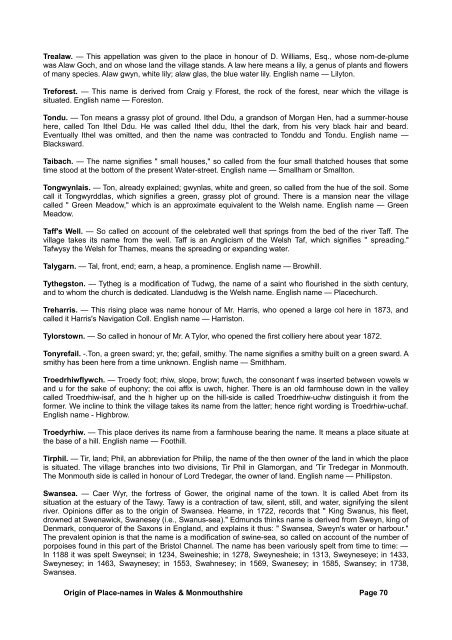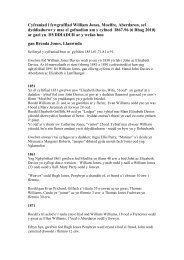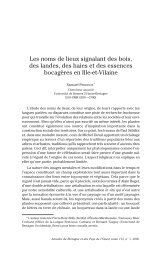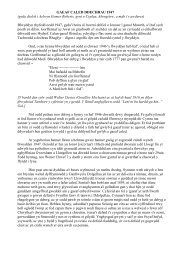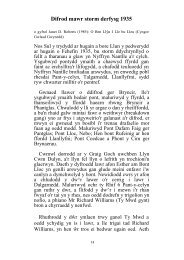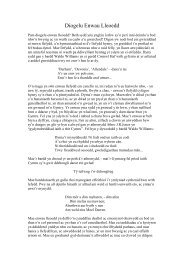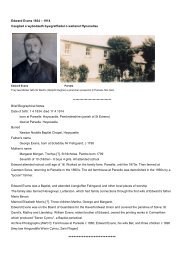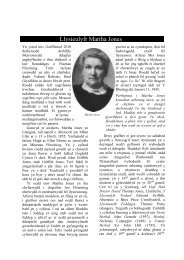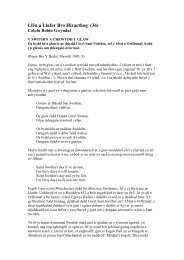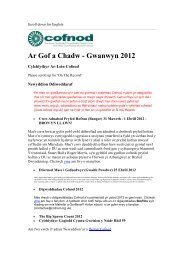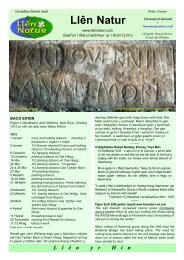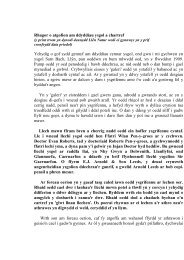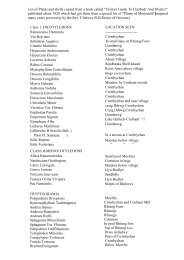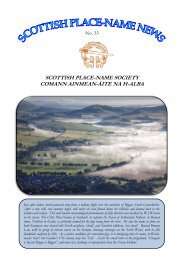Rhigos. — It is spelt Regoes <strong>in</strong> ancient MSS. It may be a compound <strong>of</strong> grug, heath, <strong>and</strong> rhos, mounta<strong>in</strong>meadow. The physical aspect <strong>of</strong> <strong>the</strong> <strong>place</strong> suggests ano<strong>the</strong>r derivation. Rhug, what has breaks or po<strong>in</strong>ts;rhos, meadow; but we ra<strong>the</strong>r th<strong>in</strong>k it is a contraction <strong>of</strong> grugos, heath, hea<strong>the</strong>r; signify<strong>in</strong>g a heathy <strong>place</strong>. The<strong>place</strong> is noted for its small batches <strong>of</strong> heath. English name — Heathham.Resolven. — Re, a corruption <strong>of</strong> rhiw, a slope, <strong>the</strong> brow <strong>of</strong> a hill; Solven, <strong>the</strong> name <strong>of</strong> <strong>the</strong> hill near which <strong>the</strong>village is situated. Solven may be a compound <strong>of</strong> siol, head, <strong>and</strong> maen a stone. Some th<strong>in</strong>k <strong>the</strong> name is acontraction <strong>of</strong> bre s<strong>of</strong>ten, which signifies <strong>the</strong> hill <strong>of</strong> stubble, but, view<strong>in</strong>g <strong>the</strong> physical aspect <strong>of</strong> <strong>the</strong> <strong>place</strong>, wera<strong>the</strong>r th<strong>in</strong>k it is a corruption <strong>of</strong> rhiw sylfan; rhiw, slope; sylfan, a <strong>place</strong> to gaze. English name — Hillview.Reynoldston. — So named <strong>in</strong> honour <strong>of</strong> Reg<strong>in</strong>ald de Breos, who was once <strong>the</strong> lord <strong>of</strong> <strong>the</strong> manor, <strong>and</strong> is saidto have been <strong>the</strong> founder <strong>of</strong> <strong>the</strong> church; Reg<strong>in</strong>ald, for <strong>the</strong> sake <strong>of</strong> euphony, be<strong>in</strong>g changed to Reynold.Rhondda. — In some old documents it is called Glyn Rhondda, Glyn Rhodneu, <strong>and</strong> by some English writersGlyn Ro<strong>the</strong>ney, <strong>and</strong> Glyn Rothire. Some th<strong>in</strong>k Rhondda is a corruption <strong>of</strong> Yr Honddu; hoen, complexion, hue;ddu black. The valley received its name, probably, <strong>in</strong> 877, when Roderic <strong>the</strong> Great divided <strong>the</strong> Pr<strong>in</strong>cipality<strong>in</strong>to three prov<strong>in</strong>ces, which were afterwards sub-divided <strong>in</strong>to cantrevs <strong>and</strong> commots. English name —Blackvale.Sketty. — An Anglicized form probably <strong>of</strong> Is Ketti. Maen Ketti signifies <strong>the</strong> stone <strong>of</strong> <strong>the</strong> Arkite power. The<strong>place</strong> was called Is Ketti from its situation at <strong>the</strong> base <strong>of</strong> <strong>the</strong> hill where Maen Ketti st<strong>and</strong>s. Is means below orunder. English name — Underhill.Skiwen. — A corruption <strong>of</strong> <strong>the</strong> Welsh Ysgawen, <strong>the</strong> elderwood, so called from <strong>the</strong> abundance <strong>of</strong> that wood <strong>in</strong><strong>the</strong> neighbourhood. English name — Elderwood.St. Ffagan. — The parish was named <strong>in</strong> honour <strong>of</strong> Ffazan, who is recorded to have founded a church here <strong>in</strong><strong>the</strong> second century.St. Bride. — Bride is probably a clipped form <strong>of</strong> Ffraid, <strong>the</strong> sa<strong>in</strong>t's name to whom <strong>the</strong> church was dedicated;hence <strong>the</strong> right name is St. Ffraid. Accord<strong>in</strong>g to Iolo Morganwg, <strong>the</strong> church was dedicated to St. Bride, <strong>the</strong>nun, <strong>the</strong> daughter <strong>of</strong> Dwpdagws, an Irish sa<strong>in</strong>t.St. Athan. — The church was built by Tathan, son <strong>of</strong> Amwn Ddu, <strong>in</strong> <strong>the</strong> sixth century, <strong>and</strong>, accord<strong>in</strong>g to <strong>the</strong> "Welsh Chronicles," his rema<strong>in</strong>s were <strong>in</strong>terred here.St. Donnatt's. — Donnatt is a modification <strong>of</strong> <strong>the</strong> Welsh Dunawd, <strong>the</strong> sa<strong>in</strong>t's name to whom <strong>the</strong> prist<strong>in</strong>echurch was probably dedicated. It was anciently called Llanwerydd, <strong>the</strong> church be<strong>in</strong>g dedicated to Gwerydd,a descendant <strong>of</strong> Bran <strong>the</strong> Blessed.St. Hilary. — Hilary is a modified form <strong>of</strong> Elari y <strong>the</strong> sa<strong>in</strong>t's name, to whom <strong>the</strong> church was dedicated.St. Nicholas. — The Welsh name is Llane<strong>in</strong>ydd, so called after E<strong>in</strong>ydd, <strong>the</strong> son <strong>of</strong> Morgan <strong>the</strong> Courteous,who, it is said, built <strong>the</strong> church. Pope Nicholas Brekspere, accord<strong>in</strong>g to Iolo Morganwg, lived <strong>in</strong> <strong>the</strong> vic<strong>in</strong>ity <strong>in</strong><strong>the</strong> twelfth century, when probably <strong>the</strong> present name was given to <strong>the</strong> <strong>place</strong>.Sully. — Abersili is <strong>the</strong> Welsh name, from its situation at <strong>the</strong> mouth <strong>of</strong> <strong>the</strong> rivulet Silt, which means <strong>the</strong>hiss<strong>in</strong>g water. Sully is a corruption <strong>of</strong> Silt. English name — Hissmouth.Skerry. — From <strong>the</strong> Norse scar, a precipitous bank <strong>of</strong> earth, a cliff, as Scarborough <strong>and</strong> <strong>the</strong> Skerries. Englishname— Cliffham.Ton. — From a farmstead so named. Ton means unploughed l<strong>and</strong>, a grassy plot <strong>of</strong> ground. English name —Plotham.Treherbert. — The name was bestowed on <strong>the</strong> <strong>place</strong> <strong>in</strong> 1851 by <strong>the</strong> Marquis <strong>of</strong> Bute <strong>in</strong> honour <strong>of</strong> Herbert, afavourite name <strong>in</strong> <strong>the</strong> Bute family. English name — Herbertston.Treorchy. — Orhy is probably a modification <strong>of</strong> <strong>the</strong> Welsh Gorchwy, <strong>the</strong> name <strong>of</strong> <strong>the</strong> rivulet on which thispopulous <strong>place</strong> is situated. Gorch-wy signifies encompass<strong>in</strong>g or overflow<strong>in</strong>g water; or, perhaps, <strong>the</strong> root isorch, a limit, a border. English name — Borderton.Orig<strong>in</strong> <strong>of</strong> Place-<strong>names</strong> <strong>in</strong> Wales & Monmouthshire Page 69
Trealaw. — This appellation was given to <strong>the</strong> <strong>place</strong> <strong>in</strong> honour <strong>of</strong> D. Williams, Esq., whose nom-de-plumewas Alaw Goch, <strong>and</strong> on whose l<strong>and</strong> <strong>the</strong> village st<strong>and</strong>s. A law here means a lily, a genus <strong>of</strong> plants <strong>and</strong> flowers<strong>of</strong> many species. Alaw gwyn, white lily; alaw glas, <strong>the</strong> blue water lily. English name — Lilyton.Treforest. — This name is derived from Craig y Fforest, <strong>the</strong> rock <strong>of</strong> <strong>the</strong> forest, near which <strong>the</strong> village issituated. English name — Foreston.Tondu. — Ton means a grassy plot <strong>of</strong> ground. I<strong>the</strong>l Ddu, a gr<strong>and</strong>son <strong>of</strong> Morgan Hen, had a summer-househere, called Ton I<strong>the</strong>l Ddu. He was called I<strong>the</strong>l ddu, I<strong>the</strong>l <strong>the</strong> dark, from his very black hair <strong>and</strong> beard.Eventually I<strong>the</strong>l was omitted, <strong>and</strong> <strong>the</strong>n <strong>the</strong> name was contracted to Tonddu <strong>and</strong> Tondu. English name —Blacksward.Taibach. — The name signifies " small houses," so called from <strong>the</strong> four small thatched houses that sometime stood at <strong>the</strong> bottom <strong>of</strong> <strong>the</strong> present Water-street. English name — Smallham or Smallton.Tongwynlais. — Ton, already expla<strong>in</strong>ed; gwynlas, white <strong>and</strong> green, so called from <strong>the</strong> hue <strong>of</strong> <strong>the</strong> soil. Somecall it Tongwyrddlas, which signifies a green, grassy plot <strong>of</strong> ground. There is a mansion near <strong>the</strong> villagecalled " Green Meadow," which is an approximate equivalent to <strong>the</strong> Welsh name. English name — GreenMeadow.Taff's Well. — So called on account <strong>of</strong> <strong>the</strong> celebrated well that spr<strong>in</strong>gs from <strong>the</strong> bed <strong>of</strong> <strong>the</strong> river Taff. Thevillage takes its name from <strong>the</strong> well. Taff is an Anglicism <strong>of</strong> <strong>the</strong> Welsh Taf, which signifies " spread<strong>in</strong>g."Tafwysy <strong>the</strong> Welsh for Thames, means <strong>the</strong> spread<strong>in</strong>g or exp<strong>and</strong><strong>in</strong>g water.Talygarn. — Tal, front, end; earn, a heap, a prom<strong>in</strong>ence. English name — Browhill.Ty<strong>the</strong>gston. — Ty<strong>the</strong>g is a modification <strong>of</strong> Tudwg, <strong>the</strong> name <strong>of</strong> a sa<strong>in</strong>t who flourished <strong>in</strong> <strong>the</strong> sixth century,<strong>and</strong> to whom <strong>the</strong> church is dedicated. Ll<strong>and</strong>udwg is <strong>the</strong> Welsh name. English name — Placechurch.Treharris. — This ris<strong>in</strong>g <strong>place</strong> was name honour <strong>of</strong> Mr. Harris, who opened a large col here <strong>in</strong> 1873, <strong>and</strong>called it Harris's Navigation Coll. English name — Harriston.Tylorstown. — So called <strong>in</strong> honour <strong>of</strong> Mr. A Tylor, who opened <strong>the</strong> first colliery here about year 1872.Tonyrefail. -.Ton, a green sward; yr, <strong>the</strong>; gefail, smithy. The name signifies a smithy built on a green sward. Asmithy has been here from a time unknown. English name — Smithham.TroedrhiwfIywch. — Troedy foot; rhiw, slope, brow; fuwch, <strong>the</strong> consonant f was <strong>in</strong>serted between vowels w<strong>and</strong> u for <strong>the</strong> sake <strong>of</strong> euphony; <strong>the</strong> coi affix is uwch, higher. There is an old farmhouse down <strong>in</strong> <strong>the</strong> valleycalled Troedrhiw-isaf, <strong>and</strong> <strong>the</strong> h higher up on <strong>the</strong> hill-side is called Troedrhiw-uchw dist<strong>in</strong>guish it from <strong>the</strong>former. We <strong>in</strong>cl<strong>in</strong>e to th<strong>in</strong>k <strong>the</strong> village takes its name from <strong>the</strong> latter; hence right word<strong>in</strong>g is Troedrhiw-uchaf.English name - Highbrow.Troedyrhiw. — This <strong>place</strong> derives its name from a farmhouse bear<strong>in</strong>g <strong>the</strong> name. It means a <strong>place</strong> situate at<strong>the</strong> base <strong>of</strong> a hill. English name — Foothill.Tirphil. — Tir, l<strong>and</strong>; Phil, an abbreviation for Philip, <strong>the</strong> name <strong>of</strong> <strong>the</strong> <strong>the</strong>n owner <strong>of</strong> <strong>the</strong> l<strong>and</strong> <strong>in</strong> which <strong>the</strong> <strong>place</strong>is situated. The village branches <strong>in</strong>to two divisions, Tir Phil <strong>in</strong> Glamorgan, <strong>and</strong> 'Tir Tredegar <strong>in</strong> Monmouth.The Monmouth side is called <strong>in</strong> honour <strong>of</strong> Lord Tredegar, <strong>the</strong> owner <strong>of</strong> l<strong>and</strong>. English name — Phillipston.Swansea. — Caer Wyr, <strong>the</strong> fortress <strong>of</strong> Gower, <strong>the</strong> <strong>orig<strong>in</strong></strong>al name <strong>of</strong> <strong>the</strong> town. It is called Abet from itssituation at <strong>the</strong> estuary <strong>of</strong> <strong>the</strong> Tawy. Tawy is a contraction <strong>of</strong> taw, silent, still, <strong>and</strong> water, signify<strong>in</strong>g <strong>the</strong> silentriver. Op<strong>in</strong>ions differ as to <strong>the</strong> <strong>orig<strong>in</strong></strong> <strong>of</strong> Swansea. Hearne, <strong>in</strong> 1722, records that " K<strong>in</strong>g Swanus, his fleet,drowned at Swenawick, Swanesey (i.e., Swanus-sea)." Edmunds th<strong>in</strong>ks name is derived from Sweyn, k<strong>in</strong>g <strong>of</strong>Denmark, conqueror <strong>of</strong> <strong>the</strong> Saxons <strong>in</strong> Engl<strong>and</strong>, <strong>and</strong> expla<strong>in</strong>s it thus: " Swansea, Sweyn's water or harbour."The prevalent op<strong>in</strong>ion is that <strong>the</strong> name is a modification <strong>of</strong> sw<strong>in</strong>e-sea, so called on account <strong>of</strong> <strong>the</strong> number <strong>of</strong>porpoises found <strong>in</strong> this part <strong>of</strong> <strong>the</strong> Bristol Channel. The name has been variously spelt from time to time: —In 1188 it was spelt Sweynsei; <strong>in</strong> 1234, Swe<strong>in</strong>eshie; <strong>in</strong> 1278, Sweynesheie; <strong>in</strong> 1313, Sweyneseye; <strong>in</strong> 1433,Sweynesey; <strong>in</strong> 1463, Swaynesey; <strong>in</strong> 1553, Swahnesey; <strong>in</strong> 1569, Swanesey; <strong>in</strong> 1585, Swansey; <strong>in</strong> 1738,Swansea.Orig<strong>in</strong> <strong>of</strong> Place-<strong>names</strong> <strong>in</strong> Wales & Monmouthshire Page 70
- Page 1 and 2:
HANDBOOK OF THE ORIGIN OF PLACE-NAM
- Page 3 and 4:
§ § § § §The Author begs to st
- Page 5 and 6:
pitiful cries of the railway offici
- Page 7 and 8:
Bishop Percy says that "in England,
- Page 9 and 10:
The city of Chester is still popula
- Page 11 and 12:
There's Cumwhitton, Cumwhinton, Cum
- Page 13 and 14:
Llwyn in its primary' sense means a
- Page 15 and 16:
PLACE-NAMES IN WALES.Wales. — The
- Page 17 and 18:
Church are generally dedicated to e
- Page 19 and 20:
think he was a contemporary of St.
- Page 21 and 22: Rhosbeirio. — Rhos, a moor, a dry
- Page 23 and 24: of Brecknock," states that this vic
- Page 25 and 26: Cam cnwir ef Cwmdu,Cwm gwyn yw & n
- Page 27 and 28: Penderyn. — A corruption probably
- Page 29 and 30: Ardudwy. — Ar, upon or above; tud
- Page 31 and 32: to mark its pre-eminence over the o
- Page 33 and 34: Some think that eirw is a corruptio
- Page 35 and 36: present form — Caerfyrddin.Abergw
- Page 37 and 38: place of refuge; hence the name. En
- Page 39 and 40: Llansawyl. — The church was dedic
- Page 41 and 42: eject. The village took its name fr
- Page 43 and 44: house, and attempted to kill an inf
- Page 45 and 46: Gwydir. — Prima facie one may tak
- Page 47 and 48: Nefyn. — The church was probably
- Page 49 and 50: DENBIGHSHIRE.Anglicized form of Din
- Page 51 and 52: Llangollen. — From Collen, a sain
- Page 53 and 54: hands into their pockets to pay a c
- Page 55 and 56: Cefn. — The name signifies a ridg
- Page 57 and 58: Maesgarmon. — Named in honour of
- Page 59 and 60: Abertridwr. — Tridwr, three water
- Page 61 and 62: it is said, was originally built by
- Page 63 and 64: Cwmllynfell. — Cwm, a narrow vale
- Page 65 and 66: Gwarycaeau. — Gwdr, the nape of t
- Page 67 and 68: means a cultivated region, a vale,
- Page 69 and 70: Penrhiwfer.- Pen, head, top; rhiw,
- Page 71: Port Talbot. — So called in 1835
- Page 75 and 76: Aberdyfi. — So called from its si
- Page 77 and 78: Llanddwywe. — From Dwywau, a desc
- Page 79 and 80: Crickhowell and some in the directi
- Page 81 and 82: Griffithstown. — This village was
- Page 83 and 84: and gwy, water. Treiddiod troth tna
- Page 85 and 86: derive Tintern from din, fortified
- Page 87 and 88: Caersws. — It appears that the Ro
- Page 89 and 90: English name — Ervylton.Llanymech
- Page 91 and 92: Angle. — Probably from the angle-
- Page 93 and 94: Gellyswick. — Another hybrid. Gel
- Page 95 and 96: that the two rivers in their flowin
- Page 97 and 98: ecame the bishop of the see, and wa
- Page 99 and 100: earth formerly stood on a summit on
- Page 101 and 102: Pilleth. — A corruption of pwll,
- Page 103 and 104: Howells, Rev. J., Mountain AshHowel
- Page 105 and 106: Williams, D., PenywernWilliams, Rev


